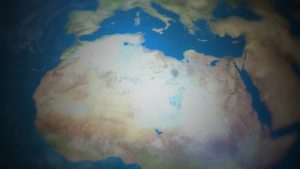The Diplomat author Mercy Kuo regularly engages subject-matter experts, policy practitioners, and strategic thinkers across the globe for their diverse insights into U.S. Asia policy. This conversation with Dr. Mordechai Chaziza – senior lecturer in political science at Ashkelon Academic College, specializing in Chinese foreign and strategic relations, and author of “China’s Middle East Diplomacy: The Belt and Road Strategic Partnership” (2020) – is the 300th in “The Trans-Pacific View Insight Series.”
Explain the geostrategic relevance of the Maghreb to China.
China has expanded its relationship with the Maghreb region primarily through growing economic and commercial ties under the new Silk Road grand strategy. The trade between the PRC and the five North African countries dropped sharply to $17.3 billion in 2020. Its investments and contracts between 2005 and 2021 stood at $30.6 billion, with Algeria receiving the lion’s share of $24.6 billion. All Maghreb states are maritime economies strategically located between Europe’s advanced economies across the Mediterranean Sea to the north, and the high-potential development of sub-Saharan Africa to the south. Geographically, their location adjacent to the Mediterranean Sea and the Atlantic Ocean has become a focus of China.
How is Beijing expanding China’s Belt and Road Initiative (BRI) in the Maghreb?
Since Chinese President Xi Jinping announced the “One Belt, One Road” initiative in 2013, the Maghreb countries have joined this initiative and signed memoranda of understanding (MoUs) and partnership agreements with China. Beijing has become active in these countries, focusing on bilateral relations while also working within the Forum on China-Africa Cooperation (FOCAC), the Union of the Arab Maghreb (UAM), and the China-Arab States Cooperation Forum (CASCF).
How are Maghreb countries engaging China’s growing influence in the region?
The Maghreb countries increasingly view Beijing as a viable alternative partner to the West (i.e. Europe and the U.S.), leading them to expand their strategic cooperation with China in economic and cultural affairs and in political and defense issues. Beijing is also showcasing its development model that seeks to combine authoritarianism with economic growth across the region. As such, the PRC’s growing role in the Maghreb is likely to have far-reaching economic and geopolitical consequences for countries in the region. The PRC’s increasing ties with these countries center mainly on trade, infrastructure projects, ports, shipping, financial cooperation, tourism, and manufacturing. China can be expected to expand and deepen these connections in the coming years, given the Maghreb’s strategic geographical location.
How does the Maghreb serve China’s overall agenda and ambitions in Africa?
The Maghreb trade routes help the PRC diversify its supply chains and create a China-Indian Ocean-Africa-Mediterranean Sea blue economic passage to connect Africa to new maritime economic corridors in Pakistan, Bangladesh, Sri Lanka, and Myanmar. For the PRC, the opportunity to contribute to and exploit the Maghreb region’s potential as a trans-Mediterranean and trans-Saharan trade hub (through its infrastructure projects and manufacturing localization) is a highly appealing primary goal BRI framework. Thus, the new Silk Road grand strategy looks set to decisively shape Chinese activities in the Maghreb region into the foreseeable future.
The Chinese target is a network of trade connectivity throughout the entire African continent. This means connectivity amongst the North African countries and across the Mediterranean and the Sahara. For example, Algeria can serve as an ideal middleman to control passageways between North Africa and Europe. It has a strategic position, situated in the middle of the Mediterranean region, between a European market marked by rapid economic development and an African continent boosted by its emergent economy and its market of hundreds of millions of inhabitants.
Assess the challenges and opportunities of China’s BRI in the Maghreb for the U.S. and Western governments.
Although China is not ready to take on a leadership role in the Maghreb region, its economic weight is slowly challenging other traditional external actors’ strategic interests, namely the U.S. and Europe. The PRC’s introducing a degree of multipolarity in the region provides local players with a new set of bargaining tools in their relationship with Western countries. This could impact the regional balance of powers and stability of the region, with far-reaching consequences on European interests in the long run. As North African countries use the PRC to diversify their political and economic ties away from the West, this trend significantly impacts the EU and the United States’ political leverage in the region.
China’s growing presence comes as a gradual U.S. retrenchment and a European identity crisis leaves the door open to the PRC’s influence. While European countries remain North African countries’ strong economic and political partners, they fail to deepen the relationship beyond short-term transactional financial and security calculations. The management of post-Arab Spring transitions, the refugee crisis, and the current conflicts in Libya have revealed the deep fragmentation amongst European countries in their policies towards the North African countries. This lack of coherent European policy towards the Maghreb region has largely dampened their influence and credibility and has pushed North African countries to seek new partners.
The Maghreb region is located at the Mediterranean’s mouth, on the southern shore of Europe, and at the Western end of the Arab world. That gives it prominence in U.S. interests in security, democratization, stability, development, and cooperation. Thus, the Biden administration should have a profound, comprehensive, and coherent strategy for North Africa because developments in the region (e.g., China’s rise in the area) impacted its national interests significantly. In recent years, the two global powers are locked in a consequential geopolitical competition right now to determine the character of the 21st century. China and the U.S. are competing in the WANA [West Africa/North Africa region] and beyond, and some aspects of the PRC’s engagement in the region are at odds with Washington’s strategic objectives and values.

































